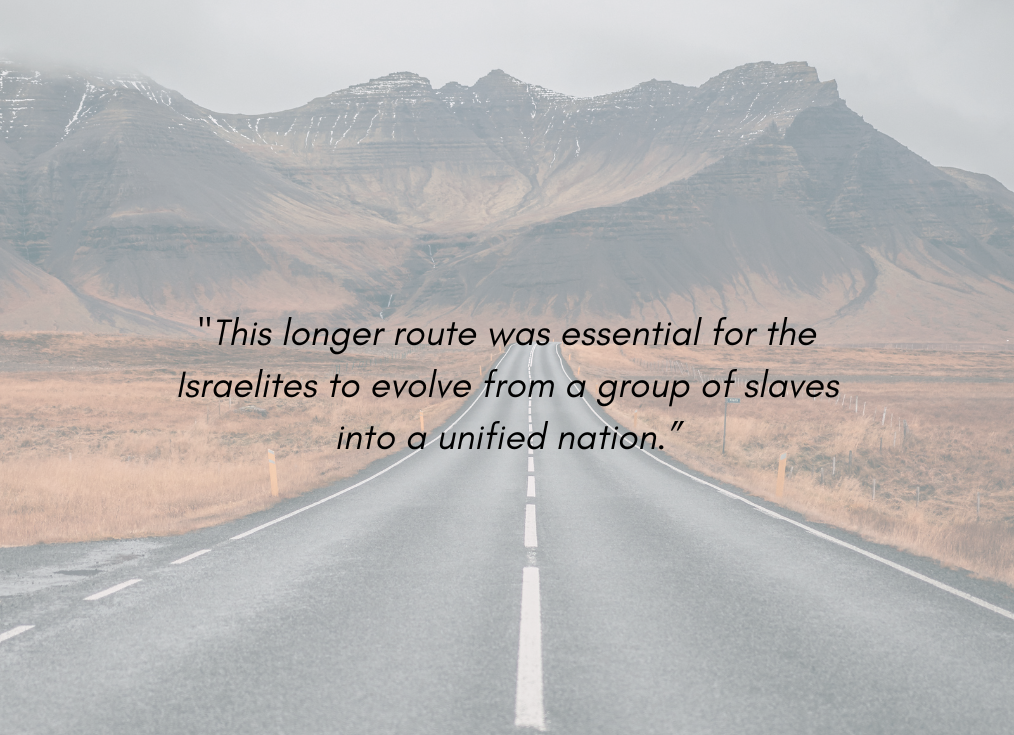The Road Less Traveled

January 26, 2024 / 16 Shevat 5784
In this week’s Torah portion, Beshalach, we encounter a pivotal moment in Jewish history: the Exodus from Egypt. The opening verses, Exodus 13:17–18, narrated that when the Israelites left Egypt, Gd did not lead them on the road through the land of the Philistines, although it was shorter. Rather, Gd led the Israelites around by the way of the wilderness toward the Reed Sea. This strategic decision by the Divine echoes profoundly with Robert Frost’s famous lines, “Two roads diverged in a wood and I – I took the one less traveled by, and that has made all the difference.”
At first glance, it might seem counterintuitive why Gd would choose a longer, more arduous path for this weak and destitute fledgling nation. However, upon deeper reflection, we realize this was not merely about reaching a destination but about embarking on a transformative journey. This longer route was essential for the Israelites to evolve from a group of slaves into a unified nation. This echoes the sentiment of Frost’s poem – the road less traveled, though more challenging, yields greater rewards.
…
The Israelites’ journey through the wilderness was not just a physical one but a spiritual and social odyssey. In their desert ordeal, stripped of their familiar slave identities, these independent spirits had the opportunity to forge a new, collective identity. It was this circuitous path that enabled them to develop shared experiences and time to get to know one another outside of their former lives. Just as a piece of coal under pressure becomes a diamond, so too did the challenges of the wilderness convert the Israelites into a cohesive, resilient nation.
This concept of a journey towards unity and collective identity is poignantly relevant as we observe Texas State Bill 1828, which designates this week as Holocaust Remembrance Week. It is a time when Texas public schools educate their K–12 students about the Holocaust and inspire responsibility to “uphold human values to prevent future atrocities.” San Antonio is fortunate to have a Holocaust Memorial Museum, a testament to the vision of those who came before us. This institution stands as our local source of learning and remembrance, embodying the spirit of taking the road less traveled for the benefit of future generations.
In the narrative of the Israelites and the somber history of the Holocaust, we see the paramount importance of unity and shared purpose. The Israelites’ journey through the wilderness was not just about reaching the Promised Land; it was about becoming a nation united in a common cause. Similarly, our remembrance of the Holocaust is not only about honoring the past; it is about forging a future where we are united in preventing acts against humanity.
The Holocaust Memorial Museum in San Antonio serves as a physical embodiment of this commitment. It is a result of the vision and dedication of those who understood the importance of education and remembrance. By taking the road less traveled, they have provided a resource that will educate and inspire generations to come.
As we reflect on the lessons of Parshah Beshalach and the observance of Holocaust Remembrance Week, let us embrace our collective experiences, both joyous and challenging, that bind us and strengthen us. The journey of the Israelites through the wilderness and our ongoing journey towards understanding and remembrance remind us that the road less traveled, though fraught with challenges, leads to a deeper, more meaningful destination: unity, strength, and a shared commitment to uphold human value.
I close this week’s message with an addendum to the words with which we challenge every museum visitor before they depart, “Now that you know, what will you do?” … to help bring us …
Shabbat Shalom.

